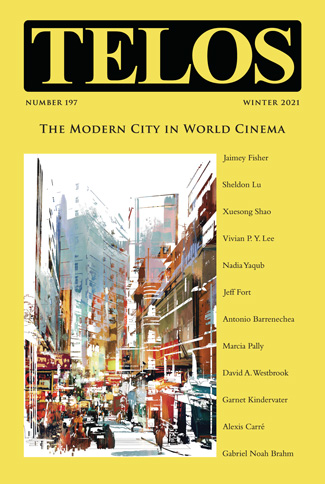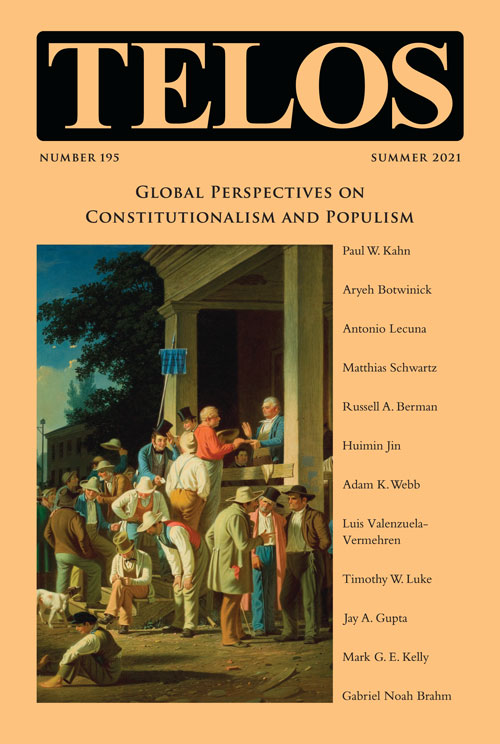The Telos Student Seminars provide a forum for students around the world to engage with critical theory by discussing a common set of paired texts from Telos—one current essay and one pertinent essay from our archives. In our second cycle of seminars, we are discussing Huimin Jin’s “Cultural Self-Confidence and Constellated Community: An Extended Discussion of Some Speeches by Xi Jinping” (Telos 195, Summer 2021) and an excerpt from Cornelius Castoriadis’s “The Crisis of Western Societies” (Telos 53, Fall 1982). The following report is from the Telos Student Seminars group in Haifa, Israel. For more details about the Telos Student Seminars, including summaries of the two essays under discussion, click here.
|
The second Telos Student Seminar will pair an essay by Huimin Jin, “Cultural Self-Confidence and Constellated Community: An Extended Discussion of Some Speeches by Xi Jinping” (Telos 195, Summer 2021, pp. 93–113), with an excerpt from Cornelius Castoriadis, “The Crisis of Western Societies” (Telos 53, Fall 1982, pp. 17–28). Our virtual gathering will feature Prof. Jin, who will be joining us from China, as well as a scholar representing the views of Castoriadis. Modeled on the study groups from which Telos first grew, yet reconceived for the digital age, the Telos Student Seminars (TSS) provide a forum for students around the world to engage with critical theory by discussing a common set of paired texts from Telos—one current essay, and one pertinent essay from our archives—to connect the past and present of the journal to its future. TSS also provides an opportunity for students to be published on TELOSscope. We seek teachers and scholars from around the world under whose aegis TSS groups can meet and who can provide students with intellectual encouragement and support. An institutional library subscription is necessary. Would you like to join us? Contact tss@telospress.com. For more information about the Telos Student Seminars, click here. The Telos Student Seminars provide a forum for students around the world to engage with critical theory by discussing a common set of paired texts from Telos—one current essay and one pertinent essay from our archives. The following reports from our first Telos Student Seminars at Concordia University in Irvine, California, and the Hopkins-Nanjing Center in Nanjing, China, compare Paul Kahn’s “Law and Representation: Observations from an American Constitutionalist” (Telos 195, Summer 2021) and Paul Piccone’s “The Crisis of Liberalism and the Emergence of Federal Populism” (Telos 89, Fall 1991). The Irvine seminar advocates addressing the political challenges highlighted by Kahn and Piccone through a new American civil religion “built on mysticism,” while the Nanjing group took the seminar as an occasion for a wide-ranging, cross-cultural discussion about society and politics. Telos Student Seminars participants across the globe will gather virtually for a discussion with Paul Kahn at the end of this month. For more details about the Telos Student Seminars, including summaries of the two essays under discussion, click here. Telos 197 (Winter 2021): The Modern City in World Cinema, edited by Jaimey Fisher and Sheldon Lu, is now available for purchase in our store. Individual subscriptions to Telos are also available in both print and online formats.
The following essay originally appeared at The Hill. It is republished here by permission of the author. The Biden administration promised to return American foreign policy to reliability and international leadership after the disruptions of the Trump years. Yet its egregious mismanagement of the exit from Afghanistan has damaged America’s global standing and undercut the credibility of three of the administration’s foreign policy planks. President Biden and Secretary of State Antony Blinken were supposed to repair transatlantic relations by reassuring our European allies, give priority to human rights in all decisions, and counter Chinese ambitions. The deeply flawed execution of the Afghanistan withdrawal undermines all those aspirations and leaves the Biden foreign policy vision in shambles. The diplomatic team that was supposed to bring professionalism has left America rudderless. Telos 195 (Summer 2021): Global Perspectives on Constitutionalism and Populism is now available for purchase in our store. Individual subscriptions to Telos are also available in both print and online formats.
|
||||
|
Telos Press Publishing · PO Box 811 · Candor, NY 13743 · Phone: 212-228-6479 Privacy Policy · Data Protection Copyright © 2024 Telos Press Publishing · All Rights Reserved |
||||









